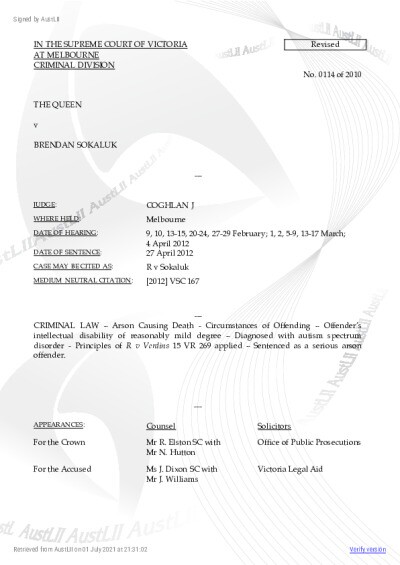
Date
Geographical Area
Pacific
Countries
Australia
Case Name
R v Sokaluk
Case Reference
[2012] VSC 167
Name of Court
Supreme Court of Victoria
Key Facts
On 7 February 2009, on what became known as Black Saturday, Brendan Sokaluk deliberately lit fires at two distinct places at an intersection in Churchill with the intention of setting fire to eucalyptus plantations. The fires – known as the Churchill fire – quickly spread. As a result of the Churchill fire, 36,000 hectares were burnt, 156 homes and a community hall were destroyed, and 10 people died.
Sokaluk was found guilty of 10 counts of arson causing death by a jury, this case concerned his sentencing.
Sokaluk was found guilty of 10 counts of arson causing death by a jury, this case concerned his sentencing.
Decision and Reasoning
The major issue for the Court in sentencing Sokaluk was whether he had impaired mental functioning, as this would reduce his moral culpability. Although the Court accepted that Sokaluk’s autism and intellectual disability amounted to a mental impairment, by virtue of s.6D of the Sentencing Act 1991, as a serious arson offender, this finding had to be balanced with the principal purpose of the sentence – the need to protect the community. Under s.6D, community protection is to be achieved by imposing a sentence that is longer than that which is proportionate to the gravity of the offence.
Despite the need for community protection requiring the Court to have less regard to personal circumstances, including impaired mental functioning, they did give some weight to the impairment. From a starting point of 25 years imprisonment – the maximum term carried by the offence – the Court took into account his reduced moral culpability, that he had no previous convictions, showed remorse, and they moderated the need for general deterrence.
Despite the need for community protection requiring the Court to have less regard to personal circumstances, including impaired mental functioning, they did give some weight to the impairment. From a starting point of 25 years imprisonment – the maximum term carried by the offence – the Court took into account his reduced moral culpability, that he had no previous convictions, showed remorse, and they moderated the need for general deterrence.
Outcome
Sokaluk was sentenced to a total of 17 years and 9 months’ imprisonment – 11 years for each charge, of which 10 years and 3 months of charges 2-10 were to be served concurrently. The Court fixed a 14 year non-parole period.
This sentence was appealed by the Director of Public Prosecutions, who claimed it was too lenient. The Court held that it was not manifestly inadequate, so the appeal was dismissed: DPP v Sokaluk [2013] VSCA 48.
This sentence was appealed by the Director of Public Prosecutions, who claimed it was too lenient. The Court held that it was not manifestly inadequate, so the appeal was dismissed: DPP v Sokaluk [2013] VSCA 48.
Link
Disclaimer
This case law summary was developed as part of the Disaster Law Database (DISLAW) project, and is not an official record of the case.
Document
Document